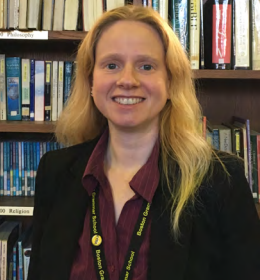This year the Kyra Research School designated, inducted and deployed its first cohort of Evidence Leads in Education (ELEs). The main purpose of the ELEs is to support school leaders throughout Lincolnshire, and beyond, in using evidence-based practice in their own context to enable school improvement.
All of our ELEs are outstanding teachers, who are also middle and senior leaders, with the skills to support individuals and teams in similar positions in other schools. ELEs are experts in using research and evidence to inform practice in the classroom, and combine their knowledge, interpersonal skills, and coaching skills to help to make evidence-based practice a reality in as many schools as possible.
Applications to become an ELE were invited over a three-week period in February 2018, (applications also had to be endorsed by the applicants headteacher or a senior leader). Applications were narrowed down to a short-list and invited for interview, with successful candidates demonstrating attributes which lent themselves to excellent communication, training and innovation, qualities which are all vital to fulfil the role. The new ELEs attended a training day in April to prepare them for their role, and will also continue to attend annual training days each year, to keep on top of the latest education theories and research.
ELEs have been deployed to support and contribute to the work of the Research School, focusing on encouraging the use of evidence to inform school improvement decisions. ELEs have been deployed in a variety of different ways so far to maximise their impact, for example, to co-design and co-deliver CPD including the TLR in Lincolnshire and Chesterfield, and to act as a coaches and mentors for practitioners who are engaged in evidence-informed interventions. Other deployments have included activities such as speaking at after-school staff meetings, leading workshops to look at the evidence on a particular area of the curriculum, facilitating a professional learning community, undertaking activities relating to evaluating interventions or projects, and co-designing micro-trials.
“The introduction of the first cohort of ELEs has really helped to build capacity within the system to further the influence and impact of research and evidence-based practice in schools across Lincolnshire and beyond”, says Juliet Brookes. “We are intending to recruit more ELEs later this term, and the hope is that we are developing a sustainable model which will continue to engage more schools in evidence-based practice, and help them to become increasingly proficient in their own right in this area.”
There are now plans to work with other local authorities and school improvement services within the East Midlands to develop further ELE hubs across the region. Kyra’s ELE model is also being replicated beyond the East Midlands, at Doncaster Research School (under the name of ‘Specialist Leaders’) and also at the Aspirer Research School in Cheshire. “It is fantastic to see other Research Schools taking up our ELE model”, says Juliet, “as it means that the impact of evidence-based practice can spread even further, and that ELE’s can help teachers and leaders to use it to enable school improvement on an even wider scale.”
Laura McQuade - An ELE
“I have been a secondary school teacher for 17 years, and wanted to further develop myself by engaging with research surrounding best practice in teaching and learning. This led to me completing a part-time PhD in Research in Education, as well as completing my own research project with the Lincolnshire Teaching Schools Alliance on self-regulatory strategy development in relation to writing. This meant guiding and enabling pupils to design their own marking schemes to support them in developing their writing skills, and I presented my research findings at a Kyra Research School workshop. When the role of ELE was advertised by Kyra, I felt that it would fit perfectly with my interests and experience and so I applied. I got through to interview and was accepted, along with six others. We had a day of induction and training, which included particular emphasis on how to support and coach others in the area of research and evidence-based practice.
After training, we were each allocated our first task as an ELE, which was designed to be in line with our own particular experience and skills. I was deployed to co-deliver the TLR in Chesterfield alongside Juliet Brookes. In this role I am helping teachers to learn all about research and evidence-based practice, and will be helping them to design, complete and evaluate their own research projects.
Being an ELE has also allowed me to make a real difference within my own school setting. Teachers at my school are given the option to engage in a research project to fulfil their annual CPD, and I support each teacher who takes this opportunity up with training and mentoring. The school is becoming much more research orientated as a result. Research posters completed by the teachers who have taken part are disseminated to staff throughout the school, as well as being displayed in the staffroom. Research and evidence-based practice make a tangible difference in the classroom, and I think it has also meant that our pupils feel even more valued, because they know their teachers are actively engaging in research to improve teaching and learning. Overall, engaging in research projects keeps us very pro-active as a staff and makes the school a very exciting place to be.”

